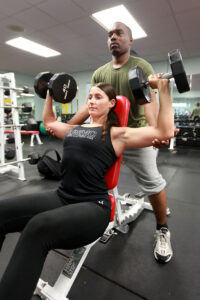
Joint Pain Relief Exercises
Key Takeaways
- Athletes require specialized healthcare solutions beyond traditional medicine, with sports medicine physicians being the cornerstone of effective treatment and prevention strategies, including joint pain relief exercises.
- A comprehensive healthcare team for athletes should include athletic trainers, physical therapists, nutritionists, and mental health professionals to address all aspects of performance and recovery.
- Advanced diagnostic tools like 3D motion analysis and sport specific imaging provide crucial insights that general medical facilities often miss.
- Performance Health Solutions offers integrated care systems specifically designed for athletes at all levels, from weekend warriors to Olympic competitors.
- Mental health support is increasingly recognized as essential for athletic performance, with specialized interventions showing up to 30% improvement in recovery times and performance outcomes.
Athletic Healthcare Needs Beyond Traditional Medicine
Athletes don't just push boundaries they live beyond them. Their bodies endure stresses that require healthcare solutions far beyond what traditional medicine typically offers. When you're training at high intensity or competing regularly, standard medical approaches often fall short because they weren't designed with the athletic body in mind.
The demands placed on athletes create unique physiological conditions that can be misunderstood in conventional healthcare settings. A regular physician might suggest rest for weeks after an injury. In contrast, a sports medicine specialist from Performance Health Solutions understands that maintaining conditioning during recovery is critical for athletes. Their specialized approach recognizes that athletes require care that balances immediate healing with long-term performance goals.
Athletes also experience a different relationship with pain and their bodies. What might be considered abnormal in a typical patient could be part of the adaptive process for someone training intensively. Understanding this distinction requires healthcare providers who speak the language of sport. They must recognize the difference between productive training discomfort and injury signals.
Specialized Medical Teams That Understand Athletes
Building an effective healthcare team means surrounding yourself with professionals who understand the athletic context. These specialists don't just treat symptoms. They approach your body as a performance system that requires integrated care. This team-based approach becomes your performance ecosystem, working together to keep you healthy and competitive.
The right medical team creates continuity of care that bridges the gap between injury treatment and performance enhancement. They communicate with each other about your unique needs, ensuring that recovery protocols align with training goals. This collaborative care model dramatically improves outcomes compared to disconnected treatment approaches.
Sports Medicine Physicians: Your First Line of Defence
Sports medicine physicians serve as the quarterbacks of athletic healthcare. These specialists have completed additional training focused specifically on the prevention, diagnosis, and treatment of sports related injuries and conditions. Unlike general practitioners, they understand the biomechanics of athletic movement and how different sports create distinct injury patterns.
Their specialized knowledge allows them to quickly identify issues that might be missed in standard medical examinations. For example, a sports medicine physician can often detect subtle instabilities or movement compensations that could lead to more serious injuries if left unaddressed. They're also familiar with the latest evidence based treatments that can accelerate healing while maintaining as much athletic function as possible.
“The difference between a good sports medicine physician and a great one isn't just their medical knowledge, it's their understanding of what it means to be an athlete. They know that ‘take two weeks off' isn't always practical advice, and they work with you to find solutions that respect both your health and your competitive goals.” Dr. James Andrews, renowned orthopaedic surgeon
Athletic Trainers: Daily Care and Injury Prevention
Athletic trainers represent the front line of sports healthcare, working directly with athletes on a daily basis. These certified professionals specialize in injury prevention, recognition, and rehabilitation. Their consistent presence allows them to spot small changes in movement or performance. This vigilance helps identify developing problems before they become serious injuries.
Beyond their daily work in injury prevention, athletic trainers create customised recovery protocols tailored to your specific needs and sport demands. They bridge the gap between medical treatment and return to play. They implement progressive rehabilitation programs that build both confidence and physical capacity. Many professional teams consider their athletic trainers to be among their most valuable assets. This is crucial for maintaining player availability throughout demanding seasons.
Physical Therapists: Rebuilding Strength and Function
While athletic trainers focus on immediate care and prevention, physical therapists specialize in comprehensive rehabilitation. These movement experts employ evidence based techniques. Their goal is to restore function, rebuild strength, and correct biomechanical issues that may have contributed to injury. Their specialised training allows them to identify subtle movement dysfunctions. This is crucial as these dysfunctions could lead to recurrent problems if not properly addressed.
The best physical therapists for athletes go beyond standard protocols, incorporating sport specific movements and progressive loading. This prepares the body for the exact demands of your activity. They understand that functional recovery means more than just pain reduction. It requires rebuilding the capacity to perform explosive, complex movements with confidence. This sport specific approach accelerates safe return to play. It also reduces reinjury risks.
Sports Nutritionists: Fuelling for Performance
Nutrition represents one of the most powerful but frequently overlooked aspects of athletic healthcare. Sports nutritionists provide specialized guidance that goes far beyond general healthy eating advice. They create nutrition plans that align with training cycles, competition schedules, and recovery needs, optimizing everything from macronutrient timing to micronutrient sufficiency.
Working with a sports nutritionist means developing individualized fuelling strategies. These strategies account for your metabolic demands, body composition goals, and performance targets. They can identify nutritional deficiencies that might be limiting recovery or performance. Often, they uncover simple dietary adjustments that yield significant competitive advantages. For many elite athletes, this personalised nutrition support becomes as essential as their physical training program.






